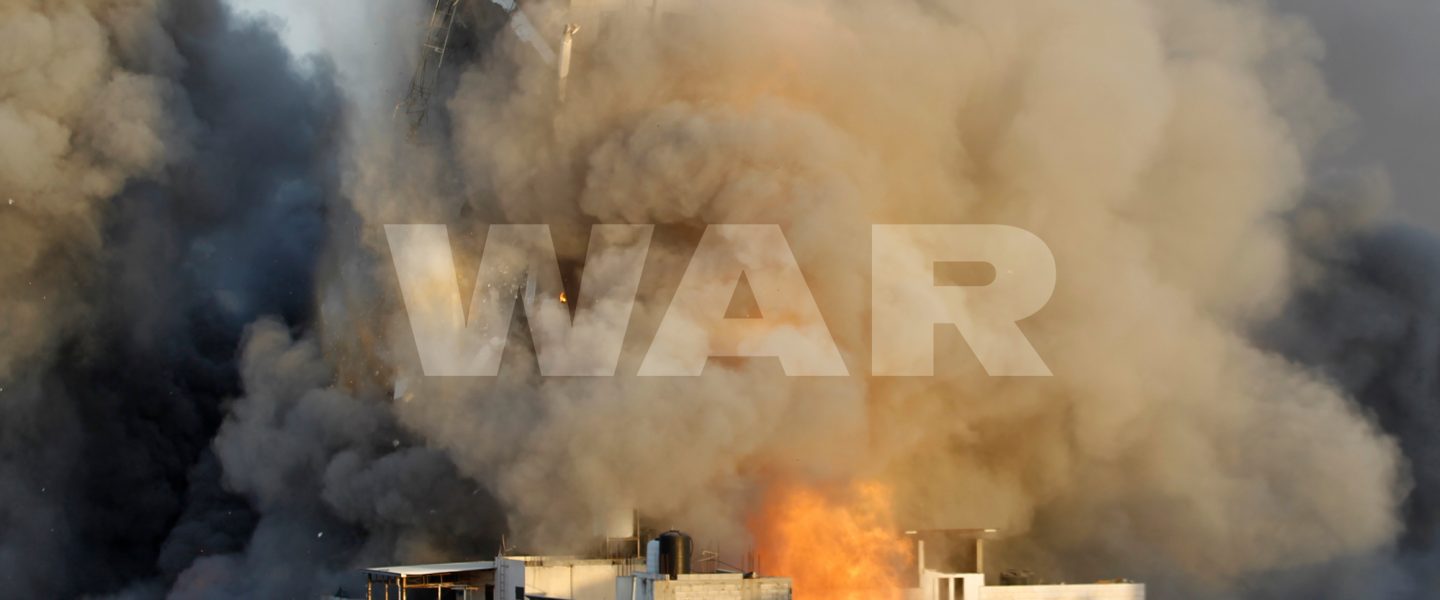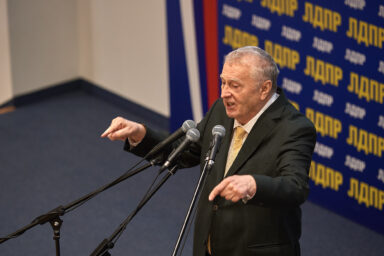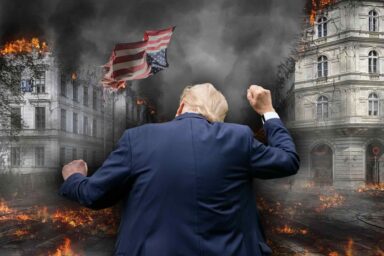Oil, War, and Patriotism
Excerpt from the book War Made Invisible: How America Hides the Human Toll of Its Military Machine.
|
Listen To This Story
|
“The most divisive time in our history was in the years leading up to the Civil War. In the mid-19th Century, differences were so profound, representatives carried weapons into Congress,” according to an expert on American history.
But these are divisive times right now. People scream at each other in spittle-flecked arguments over politics, in person and online. Or they slink below the surface, using trolls and other toxic means to discredit ideas or the people who promote them. They even slam doors on relatives and dear old friends who think differently. Some go out and buy a gun…
Among the things being fought about are why people go to war. So-called patriots insist their own nation attacks other nations only for the most honorable reasons.
If you ever argue with such people then you might appreciate some intellectual ammunition from Normon Solomon. He is co-founder of RootsAction and executive director of the Institute for Public Accuracy, and the author of a new book, War Made Invisible: How America Hides the Human Toll of Its Military Machine (The New Press, New York, 2023).
Below, we present Chapter 1 from this book.
WhoWhatWhy introduction by Milicent Cranor.
***
Chapter 1. Repetition and Omission
To victors go spoils, only they must not be called spoils. Top US officials categorically rejected assertions that war in Iraq would have anything to do with that country’s vast oil reserves. In Washington, government spokespeople were eager to frame oil as a means of establishing Iraqi self-reliance along with limiting Uncle Sam’s out-of-pocket expenses.
“Iraq is a very wealthy country,” said the chair of the Pentagon’s Defense Policy Board, Richard Perle, eight months before the invasion. “Enormous oil reserves. They can finance, largely finance the reconstruction of their own country.”1
In the fall of 2003, six months after the invasion, Secretary of State Colin Powell spoke of the need for an equitable return on beneficent services rendered, saying, “Since the United States and its coalition partners have invested a great deal of political capital, as well as financial resources, as well as the lives of our young men and women — and we have a large force there now — we can’t be expected to suddenly just step aside.”2
But some officials became more forthright. Here’s a sampling of belatedly candid statements, all from 2007:
“Of course it’s about oil, we can’t really deny that.”3 — General John Abizaid, former head of US Central Command and Military Operations in Iraq.
“I am saddened that it is politically inconvenient to acknowledge what everyone knows: the Iraq war is largely about oil.”4 — Former Federal Reserve Chairman Alan Greenspan, writing in his memoir.
“People say we’re not fighting for oil. Of course we are.”5 — Then senator and future Defense Secretary Chuck Hagel.
On the tenth anniversary of the invasion, oil expert Antonia Juhasz concluded: “Yes, the Iraq War was a war for oil, and it was a war with winners: Big Oil. … Before the 2003 invasion, Iraq’s domestic oil industry was fully nationalized and closed to Western oil companies. A decade of war later, it is largely privatized and utterly dominated by foreign firms. From ExxonMobil and Chevron to BP and Shell, the West’s largest oil companies have set up shop in Iraq. So have a slew of American oil service companies, including Halliburton,6 the Texas-based firm Dick Cheney ran before becoming George W. Bush’s running mate in 2000.
Juhasz added that “oil was not the only goal of the Iraq War, but it was certainly the central one.”7
However, candor about oil as a key goal of the Iraq War could only get in the way of PR window dressing for the war effort. To keep the whole house of dissembling cards from falling apart, the touchstone of messaging remained the need to root out terrorism.
America’s public discourse is absolutely clear, with moral condemnation of terrorists using crude explosive devices.
The practices of strapping on a suicide belt or loading a car with explosives and then blowing people up are presumed to be the diametric opposite of killing people from the air with the Pentagon’s sophisticated technology; one action is beyond reprehensible, another is patriotic service. Potential cognitive dissonance is headed off at the pass with the exculpatory assumption that the situations are entirely different — after all, the terrorist tries to kill innocent people while the US military tries not to. In American media and politics, the distinction is self-evident and axiomatic. But from the vantage point of civilians on the receiving end of the Pentagon’s destructive capacities, such distinctions are apt to make no difference.
Authorities want us to believe that the Defense Department carefully spares civilian lives. Yet, during this century, the Pentagon has killed far more civilians than al-Qaeda and other terrorist groups have.8 Without in the slightest absolving those terrorists for their crimes, that reality should give us cause to ponder and reevaluate the standard Manichean auto-pilot of American thought.
A parallel reality also debunks many pretensions about the effectiveness of the “war on terror.” During its first 20 years, journalist Nick Turse noted in 2022, “the number of terrorist groups threatening Americans and American interests has, according to the US State Department, more than doubled.”9
Supporters of the invasion of Iraq tried to justify it as integral to the US fight against terrorism, although Saddam Hussein had nothing to do with 9/11 or al-Qaeda. (The invasion actually created the conditions that fostered the formation of terroristic groups such as ISIS.)
Regardless, as the occupation dragged on with unanticipated numbers of US troops among the dead and wounded, more commentators back home began to say that the invasion had been an enormous foreign policy mistake. The word “blunder” was often used, as though the main importance of the mass slaughter and devastation was a bad move on a geopolitical chessboard. It was mainly about us. When losses were emphasized, they were singularly American: lives, billions of dollars, and strategic leverage in the region.
***
During 50 years after the Vietnam War, the United States grew accustomed to asserting the right and power to make war in a variety of distant countries. Major interventions of the 1980s were confined to the Western Hemisphere — the tiny island of Grenada and then Panama — but those two invasions turned out to be opening acts in a rejuvenating quest for geopolitical dominance. “By God, we’ve kicked the Vietnam syndrome once and for all,” President George H.W. Bush gloated at the end of the Gulf War in 1991, as if public aversion to war-making had been a shameful impediment to American glory.10
Eight years later, President Bill Clinton lauded the USA’s leadership in the NATO air war on Yugoslavia.11 By the turn of the century, political elites and mass media had celebrated an unbroken string of US military triumphs for two decades.
Those decades before 9/11 prefigured the “war on terror.” Afterward, the customary wartime features of media boosterism and political bombast went from intermittent to chronic. While the United States was obviously at war in Afghanistan and then Iraq, Libya, and Syria, warfare elsewhere was apt to be a complete mystery for most citizens, even while Pentagon budgets kept climbing.
What all that warfare was really doing to Americans got scant attention from media or entrenched politicians, while the actual impacts on people living in the battleground countries were scarcely blips on news screens. Media echo chambers assumed the good intentions if not always the competence of US leaders in the ongoing war that had been vowed against far-flung terrorism.
As years went by, a new normal of war footing took hold and tightened its grip on the United States, without any foreseeable end point or need for fresh justification.
Notes
- Victor Navasky and Christopher Cerf, “Who Said the War Would Pay for Itself? They Did!,” The Nation, March 13, 2008.
- Powell speaking in interview with French network TV2; transcript released by US Department of State, September 12, 2003.
- Matt Corley, “Abizaid: ‘We’ve Treated the Arab World as a Collection of Big Gas Stations,’” ThinkProgress, October 15, 2007, archive.think progress.org/abizaid -weve-treated- the-arab world-as-a-collection-of-big-gas-stations-cb2612fcd0bd.
- Bonnie Bricker, Erik Leaver, and Adil E. Shamoo, “The Costs of War for Oil,” Foreign Policy in Focus, October 19, 2007.
- Bricker, Leaver, and Shamoo, “Costs of War for Oil.”
- Andrew E. Kramer, “In Rebuilding Iraq’s Oil Industry, US Subcontractors Hold Sway,” New York Times, June 16, 2011.
- Antonia Juhasz, “Why the War in Iraq Was Fought for Big Oil,” CNN.com, April 15, 2013.
- “Al-Qaeda Terrorist Attacks by Number of Deaths from 1993 to 2010,” Statista, May 2011.
- Nick Turse, “A Blank Check for Endless War,” TomDispatch, January 4, 2022.
- George H.W. Bush, “Remarks to the American Legislative Exchange Council,” March 1, 1991, www.presidency.ucsb.edu/documents /remarks-the-american-legislative- exchange -council-0.
- On April 20, 1999, the nation was shocked by a massacre at Columbine High School in Colorado. A pair of seniors used shotguns and other weaponry to kill 12 fellow students and a teacher. At the time, it was the highest death toll from a mass shooting at a high school in the United States. Underscoring the cruel derangement was the fact that the assailants even made some bombs to plant at the school.
The tragedy at Columbine occurred on the 28th straight day of the US-led NATO bombing of Yugoslavia that killed five hundred civilians, many of them children, according to Human Rights Watch; the Yugoslav government said the number of civilians killed was much higher. Missiles hit schools, hospitals, factories, bridges, and stores.
At the outset of the bombing, President Bill Clinton declared in a televised address, “Our thoughts and prayers tonight must be with the men and women of our armed forces, who are undertaking this mission for the sake of our values and our children’s future.”
A few weeks later, on television again, Clinton was deploring what happened at Columbine, on a day when the bombing of Yugoslavia happened to be heavier than ever. “We do know,” the president said, “that we must do more to reach out to our children and teach them to express their anger and to resolve their conflicts with words, not weapons.”
The utterly conflicting assertions from the president merited scrutiny in tandem. But in the irony-free zone of war-desensitized media, such contradictions would be far too uncomfortable to explore.




